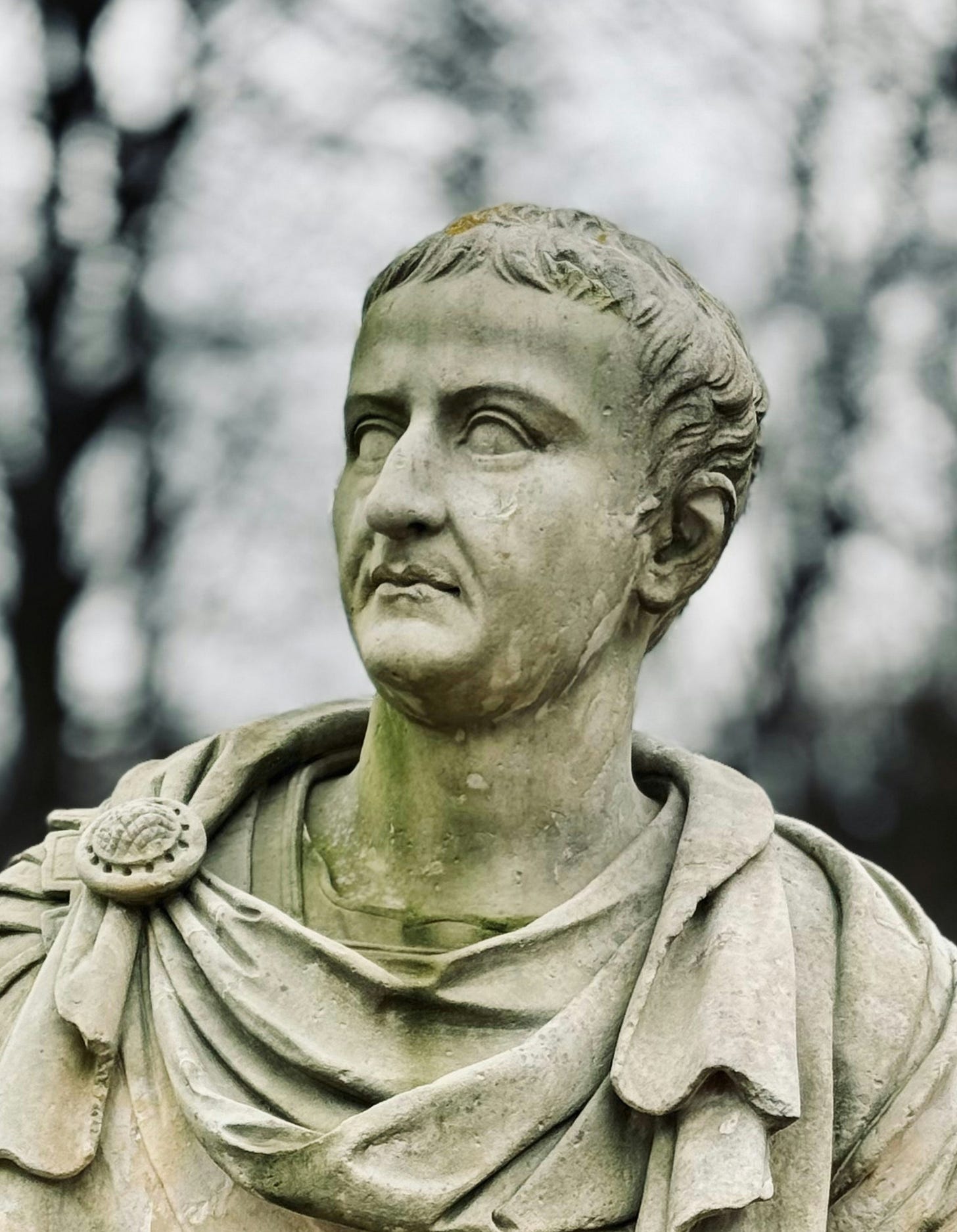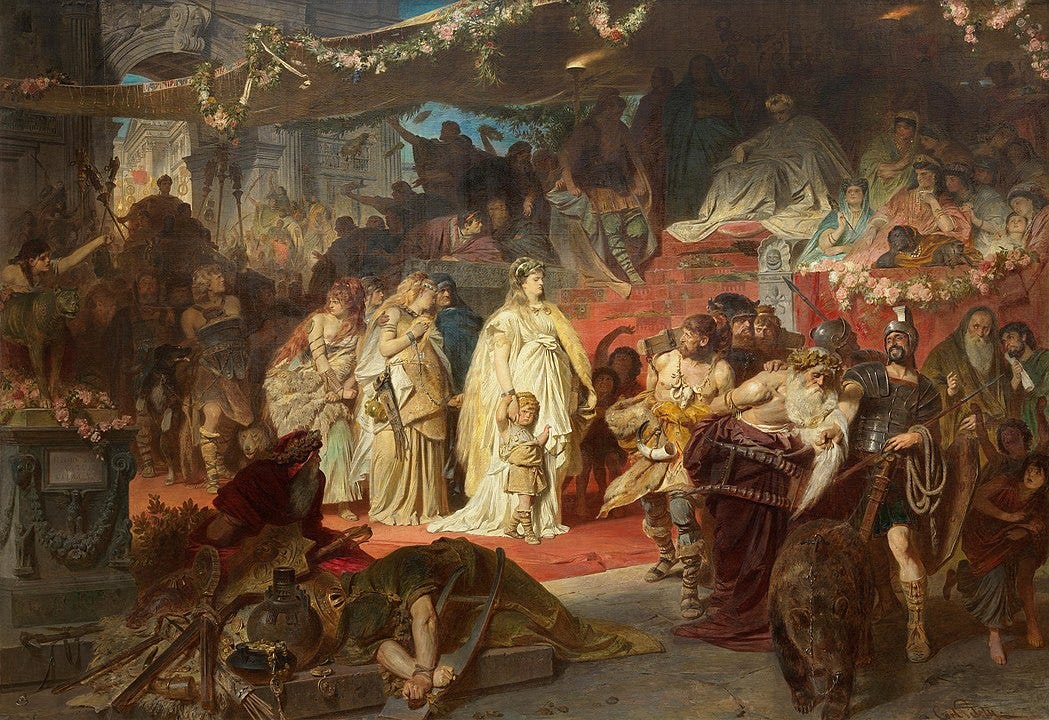The Night a Roman Legion Surrendered to the Moon
Roman Historian Tacitus records a night when a military mutiny was stopped by the mere occurrence of clouds passing over the moon's light. Let's read about it.
Photo by Brody Childs. Unsplash. Public Domain.
The Republic was gone. Leaving the sun and moon to rise upon a new era of Rome: An Empire. The very first leader of this new era, Emperor Augustus, had recently passed away, leaving his laws to be upheld by the Senate, his statues to be uplifted alongside the gods, and his son, Tiberius, to hold his position.
The news of Augustus’ death sent shockwaves throughout the Empire. After weeks of circulating and spreading, it reached the Legions (military units) stationed in Pannonia, near Rome’s southeast borders. The soldiers stationed in the camps found the news as surprising as the rest of Rome. But they did not just mourn his death; they saw it as an opportunity for change.
Since the Emperor was dead, it was assumed a new leader would rise to take his place. Offically, it was Tiberius, his son. To the Legions in Pannoia, though, it was whoever gave them a better outcome of their service to the State. They began demanding better rights and a favorable end to their long, cold, and stamina-depleting tour.
They knew as much as we do about history, that when a Roman Consul or popular leader is exiled or killed, legions across the empire are the first ones consulted with the sudden change of power. It is a lot easier for a new leader to exert his influence and control over his subjects when the military is breathing down their necks. The Legions knew the new Emperor would need their support, so the opportunity was perfect to start complaining. And they complained. Loudly.
Both young and old soldiers, in extraordinary speeches and displays, told of harrowing, abusive Centurions’ (Generals) discipline, showing their battle-hardened bodies filled with scars not given by the enemy across the border, but from their very own commanders (Happens in other empires too).
One soldier named Percennius rallied the soldiers with a speech, where he asked the riled crowd, “When will you dare to demand relief, if you do not go with your prayers or arms to a new and yet tottering throne?” They spoke together of the low pay and the high number of years they were required to serve the state. After all, they thought, it was their offensive missions against the Gauls and Germans and their defensive position in Pannonia that was keeping the Empire together!
Statue of Emperor Tiberius. Photo courtesy of Roman Empire Times.
Upon hearing their complaints as well as a few episodes of violence among the growing mutiny, Emperor Tiberius sent his son Drusus with a letter and an accompanying party of soldiers to the mutinous legions.
Drusus came before the legions while his men silently lurked around their tents in case of sudden disarray (I’m sure that didn’t cause fear..), and pulling out his letter from Tiberius, he began reading it aloud. The contents of the letter did not please the soldiers. It announced that their numerous demands would be put on hold until the Senate was given the chance to discuss the matter with the Emperor.
We can all relate to this.. calling insurance companies, service providers etc etc.
According to Tacitus, the letter explained that the reason for Drusus’s appearance was simply to “concede unhesitatingly what could be immediately granted.” The legions began repeating their demands. Drusus referred to the letter again as his response, quickly testing the crowd’s patience. The crowd continued to complain together about Drusus and the unmet demands. Now, inquiring how the Senate, rather than the Emperor, would be able to satisfy their hopes of escaping abusive Centurions or grant them a shorter service in the army. Not something you want to hear as the Emperor’s heir..
“Thusnelda in the Triumphal Procession of Germanicus” by Carl Theodor von Piloty. A painting depicting the state of Rome during these years. Wikicommons.
As night came upon the whole scene of soldiers that were gathered, Drusus and his party slowly began preparations to leave and head back to his father and the Senate. The soldiers went back to their tents. One Centurion of the camp, Cneius Lentulus, seeing the danger upon himself in the camp as he had been a known supporter of harsh discipline, started to leave with Drusus, only to be halted by the Legions. Tacitus plays out the scene:
“they surrounded him, and asked him again and again whither he was going; was it to the emperor or to the Senate, there also to oppose the interests of the legions. At the same moment they menanced him savagely and flung stones. And now, bleeding from a blow, and feeling destruction certain, he was rescued by the hurried arrival of the throng (crowd) which had accompanied Drusus.”
The situation startled more soldiers, creating a new crowd of Drusus men and the rebellious Legions. Consider how the soldiers awakened by the noise of this attack would be in confusion. “What in Pluto is going on?” Hearing a commotion and observing in confusion, all they may have seen is Drusus and his men coming upon their fellow soldiers.
The men of Drusus would have viewed Cneius’ fate similarly to theirs, possibly making them each draw their weapons in defense. It appeared as if both sides were about to twirl into a massive brawl. Such bloodshed in the dark could result in soldiers killing their fellow complainers, as had happened in previous mutinies.. The situation, argued Tacitus, “threatened an explosion of crime.” Drusus himself could be killed and bring about a new civil war, as he was the son of the Emperor. A war could be started between the legions here in the east against other groups in the west, testing each one’s loyalty to the State.
The whole Empire brought forth by Augustus was at stake during this very night. One can only imagine the fear that would of gripped Drusus, as well as the older soldiers who knew exactly where this could go. The Emperor’s son, coming back wounded or even dead, would not go well for the Legions.
But suddenly, before any large violence had sparked, a cloud went forth over the moon, dimming its light amid the nightly scene. This event radically changed the legion’s mood. Tacitus tells the story as follows:
“Suddenly in a clear sky the moon’s radiance seemed to die away. This the soldiers in their ignorance of the cause regarded as an omen of their condition, comparing the failure of her light to their own efforts, and imagining that their own attempts would end prosperously should her brightness and splendor be restored to the goddess. And so they raised a din with brazen instruments and the combined notes of trumpets and horns, with joy or sorrow, as she brightened or grew dark. When clouds arose and obstructed their sight, and it was thought that she was buried in the gloom…they lamented that this was a portent of never-ending hardship, and that heaven frowned upon their deeds.”
The Moon literally emoted at them. :(
At this change of emotions among the Legions, Drusus commanded his men to go around the camp and persuade the more popular soldiers to wait for the Senate’s response and ask how exactly they planned to satisfy the soldier’s demands without the Senate or Emperor. It surprisingly worked; the rebellious soldiers moved back to their stations. The situation became calm again, with Drusus gaining enough support among the soldiers to punish the leaders of the mutiny, Vibulenus and Percennius.
Illustration by Eilhu Vedder. Wikicommons.
We can only ponder the psychology of the rebellious soldier’s sudden burst into celebration and lament as the Moon stood silently over them. Given their celebrations and lament, as well as Tacitus’ note of the Moon’s gloom (as if it’s a person), it is plausible that the religious culture surrounding the Moon had been a significant reason for their reaction.
For hundreds of years, the Romans saw the Moon (Luna) as a ruler of the celestial realm, along with the Sun (Sol) and surrounding stars (Hyperion) in the sky, which together were a family of the Pantheon of Gods. The Moon, like the Sun and stars, represented a godly figure in the Roman Pantheon - the Goddess Luna, who gave the Romans growth, healing, fertility, and dreams.
It may be that, upon seeing the Goddess be repeatedly dimmed and brightened again and again by the clouds, they assumed she was calling for their attention to her and was offering a sign to stop what they were doing. Roman Historian Cassius Dio, similarly to Tacitus, reasons the soldiers’ change of mood to a bad Omen: “But when the moon suffered eclipse, they took the omen to heart and their spirit abated, so that they did no further harm to this detachment and dispatched envoys again to Tiberius.” But as there were many soldiers, with numerous different backgrounds, I can’t help but wonder if some held alternative reasons to back down and surrender to the Moon’s gaze.
Consider if for example, a soldier looking upon the Moon and watching it be covered by the clouds, would recall their previous occupation that the Moon had affected. Perhaps some of the vocal were farmers in earlier stages of life and reminisced about how the moon, in their culture, engineered their fields by producing the dew of crops and supporting the growth of trees.
The moon, to those present in the Empire as well as their ancestors in the Republic, was a guiding light in agricultural practices. Roman Religion Professor Eugene Tavenner captures the deep relationship between the Roman Farmer and the Moon in a paper, saying, “The careful Roman farmer consulted the moon when he dug his ditches, when he set his hens, when he sheared his sheep, and when he had his hair cut.”
This close connection between the moon and their civilian activities had made them trust the light of the moon. So to see it dim so suddenly before their actions, must have made them feel remorse and perhaps pity for Cneius and grace for Drusus.
Soldiers with backgrounds at sea could have had different thoughts rolling through their minds. Merchant sailors, before joining the military, had experienced the Moon’s luminescence as it guided their ship upon dark waters; perhaps they played back the days when it had eased their fear of being lost to the sea, with its light exposing their surroundings. With the Moon being such a trusted guide among the waters, they could have considered its coverage from the clouds as an omen that this time, its light was exposing them.
I want to believe it was everything at once. Culture, music, memories, and sorrow had filled the place. Making this odd scene where a bunch of soldiers on the cusp of incredible destruction changed their minds and started pulling out instruments, rather than swords. It is episodes such as this, no pun intended, which bring life to the forgotten Roman soldier in history, who, barely surviving the wars and winters, would of not have passed into Tacitus’ Annals if it wasn’t for the Moon.. and the mutiny for that matter.
Loved the content? Please consider subscribing for free and sharing the post!
Sources
Primary:
Cassius Dio. “Roman History.” Loeb Classical Library Edition. 1924. Page 124. https://penelope.uchicago.edu/Thayer/e/roman/texts/cassius_dio/57*.html
Tacitus. “Annals and Histories: Book I.” Translation by Alfred John Church. Everyman’s Library. Pages 16-20.
Virgil. “Georgics: Book I.” Translation by A.S. Kline. Lines 424-460. https://www.poetryintranslation.com/PITBR/Latin/VirgilGeorgicsI.php#anchor_Toc533589854
Secondary:
Milojkovic, Nena. “Luna Goddess: The Majestic Roman Moon Goddess.” History Cooperative website. https://historycooperative.org/luna-goddess/
Tavenner, Eugene. “The Roman Farmer and the Moon.” Transactions and Proceedings of the American Philological Association. Published in JSTOR. Page 77. https://www.jstor.org/stable/282995?seq=11








Fantastic insight into premodern (classical) belief!